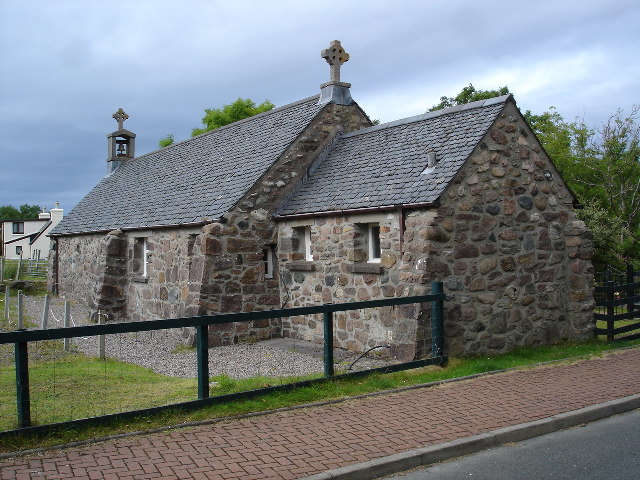
The old Parish of Gairloch was the last in the Diocese of Ross to lose its Episcopalian priest after the Revolution of 1688, when the Reverend R MacKenzie died in 1710.
In 1950 regular services began in the Gairloch Hotel. In the 1960’s the congregation moved to the Village Hall at Poolewe. When news came that the hall was to be demolished, a building fund for a new church was launched.
Major and Mrs Buchanan MacDonald made a gift of an old byre and soon work began to reconstruct the building to conform to the traditional design of the old Celtic churches. The Church was dedicated in 1965, the first Scottish Episcopal Church to be built in North-West Scotland since the Jacobite rebellion of 1745. The church is dedicated to St Maelrubha (642-722 AD), one of the most important missionaries of the early church in Wester Ross and the north-west Highlands, particularly in the area around Poolewe.
All the furnishings were donated by various benefactors from throughout the UK and other parts of the world. The font is one of a matching pair of holy water stoups which came from the Catholic Apostolic Church in Glasgow, the other being used by the church in Brora. The sanctuary chair once belonged to Bishop Eden.
One feature is a piece of stone with a distinctive Celtic carving, set into the wall beside the window to the left of the altar. It was found amongst the ruins of the old monastery at Applecross and is thought to be a fragment of the Celtic cross erected as a monument to St Maelrubha.
We sing the praise of him who died,
of him who died upon the cross;
the sinner's hope let men deride;
for this we count the world but loss.
Inscribed upon the cross we see
in shining letters, God is love:
he bears our sins upon the tree:
he brings us mercy from above.
The cross: it takes our guilt away,
it holds the fainting spirit up;
it cheers with hope the gloomy day,
and sweetens every bitter cup.
It makes the coward spirit brave,
and nerves the feeble arm for fight;
it takes its terror from the grave,
and gilds the bed of death with light.
The balm of life, the cure of woe,
the measure and the pledge of love,
the sinner's refuge here below,
the angel's theme in heaven above.

No comments:
Post a Comment